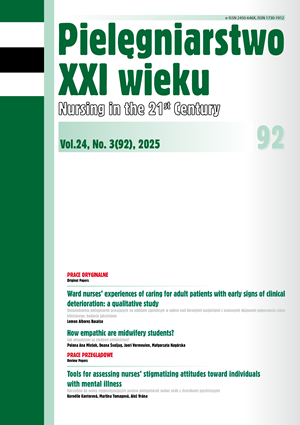The attitudes of medical staff towards pain intensity assessment in newborns treated in the Neonatal Intensive Care Unit
DOI:
https://doi.org/10.12923/pielxxiw-2025-0023Keywords:
treatment, pain, prematurity, analgesia, newbornAbstract
ABSTRACT THE ATTITUDES OF MEDICAL STAFF TOWARDS PAIN INTENSITY ASSESSMENT IN NEWBORNS TREATED IN THE NEONATAL INTENSIVE CARE UNIT
Introduction. Neonatal pain management is a critical aspect of care in intensive care units, yet it is often underestimated and undertreated. The aim of this study was to assess the knowledge, attitudes, and practices of medical personnel regarding neonatal pain in intensive care settings, with a particular focus on neonatal nursing.
Material and methods. A cross-sectional survey was conducted among127 healthcare professionals working in neonatal intensive care units (NICUs). A diagnostic survey method was applied, which included a self-authored questionnaire (SAQ) complemented by the standardized Infant Pain Questionnaire.
Results. The analysis revealed signifi cant statistical diff erences (p=0.03) between two groups: those who completed a specialization in a field other than neonatal nursing (M=52.16%) and those who specialized in neonatal nursing (M=68.47%). Participants with a specialization in neonatal nursing had a signifi cantly higher level of knowledge.. The level of education had a major impact on knowledge about pain management in newborns, with a p-value of 0.006. The statistical analysis using Pearson’s chi-square test (χ² = 30.35, df = 9, p = 0.00038) revealed a signifi cant association between the professional specialisation and the recommended amount of glucose/sucrose to be administered.
Conclusions. There is a concerning gap between the recognition of pain in neonates and the actual implementation of pain relief strategies. This contrast is particularly evident in the case of intubation, where pain management is often inadequate.
References
1. Akuma A, Jordan D. Pain management practices in neonatal intensive care units in the UK: A national survey. Neonatal Pain Management Journal. 2017;45(2):37-42. https://doi.org/10.1111/j.1365-2648.2011.05837.x
2. Fajolu IB, Dedeke IOF, Ezenwa BN, et al. Non-pharmacological pain relief interventions in preterm neonates undergoing screening for retinopathy of prematurity: a systematic review. BMJ Open Ophthalmol. 2023;8(1):e001271. https://doi.org/10.1136/bmjophth-2023-001271
3. Oliveira DJD, Medeiros KS, Sarmento ACA, et al. Use of glucose for pain management in premature neonates: a systematic review and meta-analysis protocol. BMJ Open. 2021;11(12):e052901. https://doi.org/10.1136/bmjopen-2021-052901
4. Mala O, Forster EM, Kain VJ. Neonatal Nurse and Midwife Competence Regarding Pain Management in Neonates: A Systematic Review. Adv Neonatal Care. 2022;22(2):E34-E42. https://doi.org/10.1097/ANC.0000000000000911
5. Byrd PJ, Gonzales I, Parsons V. Exploring barriers to pain management in newborn intensive care units: a pilot survey of NICU nurses. Adv. Neonatal. Care. 2009;9(6):299-306. https://doi.org/10.1097/ANC.0b013e3181c1ff9c
6. Obeidat HM, Dwairej DA, Aloweidi AS. Pain in Preterm Infants: Different Perspectives. J. Perinat. Educ. 2021;30(4):185-195. https://doi.org/10.1891/J-PE-D-20-00032
7. Queirós I, Moreira T, Pissarra R, et al. Non-pharmacological management of neonatal pain: a systematic review. Minerva Pediatr. (Torino). 2023;75(2):282-295.
https://doi.org/10.23736/S2724-5276.22.06871-9
8. Stevens B, Yamada J, Ohlsson A, et al. Sucrose for analgesia in newborn infants undergoing painful procedures. Cochrane Database Syst. Rev. 2016;7(7):CD001069. https://doi.org/10.1002/14651858.CD001069.pub5
9. Hatfield LA, Murphy N, Karp K, et al. A systematic review of behavioral and environmental interventions for procedural pain management in preterm infants. J. Pediatr. Nurs. 2019;44:22-30. https://doi.org/10.1016/j.pedn.2018.10.004
10. Neshat H, Hassankhani H, Jabraeili M, et al. Organisational challenges of pain management in neonatal intensive care unit: a qualitative study. BMJ Open. 2023;13(9):e072695. https://doi.org/10.1136/bmjopen-2023-072695
11. Bhalla T, Shepherd E, Tobias JD. Neonatal pain management. Saudi J. Anaesth. 2014;8(1):S89-97. https://doi.org/10.4103/1658-354X.144085
12. Hudson-Barr D, Capper-Michel B, Lambert S, et al. Validation of the pain assessment in neonates (PAIN) scale with the neonatal infant pain scale (NIPS). Neonatal. Netw. 2002;21(6):15-21. https://doi.org/10.1891/0730-0832.21.6.15
13. Malarvizhi G, Manju V, Roseline M, et al. Inter-rater reliability of neonatal infant pain scale (NIPS) as a multidimensional behavioural pain tool. Nitte University Journal of Health Science. 2012;2(1):26-30. https://doi.org/10.1055/s-0040-1703551
14. Al Qadire M, Al Khalaileh M. Jordanian nurses knowledge and attitude regarding pain management. American Society for Pain Management Nursing. 2014;15(1);220-228.
https://doi.org/10.1016/j.pmn.2012.08.006
15. Van Niekerk LM, Martin F. Tasmanian nurses’ knowledge of pain management. International Journal of Nursing Studies. 2001;38(2);141-152.
https://doi.org/10.1016/s0020-7489(00)00053-5
16. Ranger M, Grunau RE. Early repetitive pain in preterm infants in relation to the developing brain. Pain Manag. 2014;4(1):57-67. https://doi.org/10.2217/pmt.13.61
17. Cong X, Wu J, Vittner D, et al. The impact of cumulative pain/stress on neurobehavioral development of preterm infants in the NICU. Early Hum Dev. 2017;108:9-16. doi:10.1016/j.earlhumdev.2017.03.003
18. Teng CJ, Abbott FV. The formalin test: a dose response analysis a three developmental stages. Pain. 1998;76:37-347. https://doi.org/10.1016/S0304-3959(98)00065-7
19. Akuma AO, Jordan S. Pain management in neonates: a survey of nurses and doctors. Journal of Advanced Nursing. 2012;68(6):1288-1301.
https://doi.org/10.1111/j.1365-2648.2011.05837.x
20. Huang CM, Tung WS, Kuo LL, et al. Comparison of pain responses of premature infants to the heelstick between containment and swaddling. J. Nurs. Res. 2004;12;31-40. https://doi.org/10.1097/01.jnr.0000387486.78685.c5
21. Gradin M, Finnstrom O, Schollin J. Feeding and oral glucose – additive effects on pain reduction in newborns. Early Human Development. 2004;77:57-65.
https://doi.org/10.1016/j.earlhumdev.2004.01.003
22. Mosayebi Z, Javidpour M, Rahmati M, et al. The effect of kangaroo mother care on pain from heel lance in preterm newborns admitted to neonatal intensive care unit: a crossover randomized clinical trial. J. Compr. Ped. 2014;5(4):e22214.
Downloads
Published
Issue
Section
License
Copyright (c) 2025 Authors

This work is licensed under a Creative Commons Attribution 4.0 International License.




